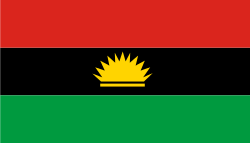Southeastern Nigeria
'Southeastern Nigeria was one of the initial Nigerian twelve states that were created during the Nigerian civil war. It was later divided into the present Akwa Ibom State and Cross River State. In the 1990s, Southeast became the name of one of the six geo-polictical zones consisting of the Abia State, Anambra State, Ebonyi State, Enugu State, Imo State.
"Precolonial" era
Before Nigeria became a country through British colonial government, Southeastern Nigeria was a home to many ethnic groups such as the Igbo, Ijaw, Ibibio, Efik, Annang, Ekoi, etc. Although these groups mostly had democratic systems of government, there were several kingdoms. Some of these kingdoms such as the Kingdom of Nri, Akwa Akpa (Calabar), Aro Confederacy, Opobo etc. had considerable influence in the region. The region was diverse, yet the groups mostly lived in peaceful coexistence.
Colonial era
British conquest of the present Nigeria and eventual independence resulted in the creation of regions in Nigeria which included the Eastern Region. These negatively affected the relationship among the various groups in the new country as they engaged in unhealthy competition for British jobs.
Nigerian–Biafran War

After two coups, a series of massacres orchestrated by Northern Muslims against Eastern Nigerians living in Northern Nigeria took place in 1966 which resulted in the Eastern region declaring the independent state of Biafra in May 1967 and eventually the Nigerian Civil War (1967-1970). After three years of tenacious resistance, Biafra was defeated.
Modern
Regional politics and the civil war worsened the relationship between the Southeastern groups immediately after the war. However, recently the relationship has been gradually improving.